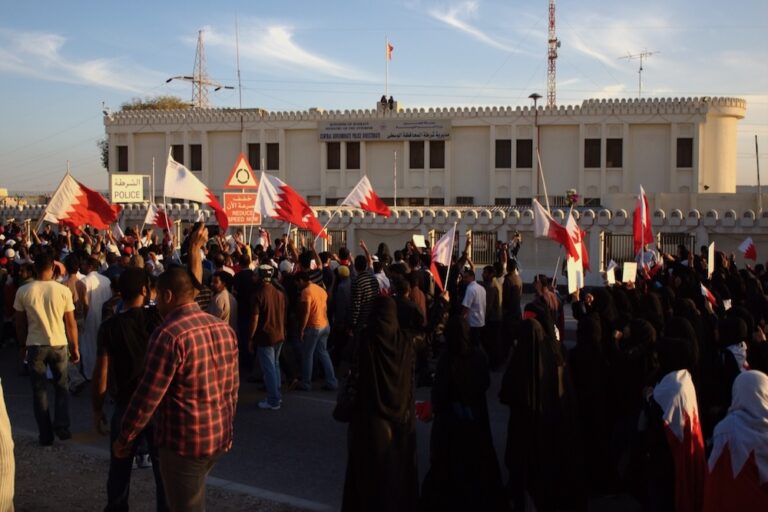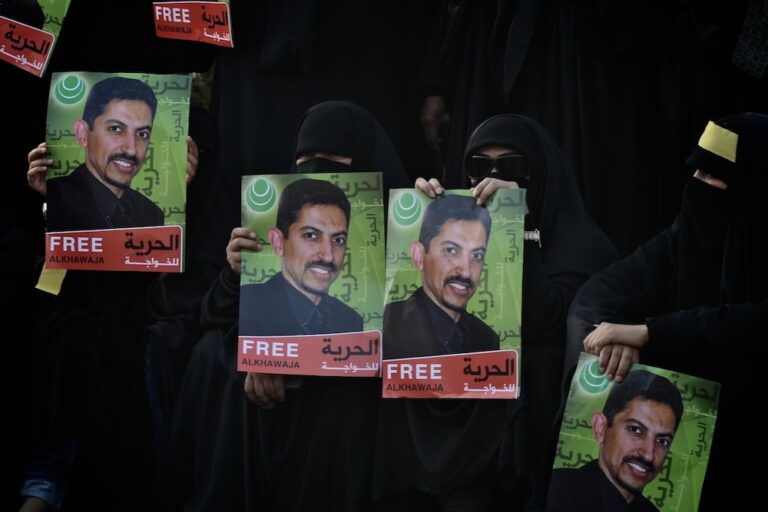BCHR expressed concern over the unwritten rules of censorship that journalists must observe when discussing certain institutions and people.
(BCHR/IFEX) – 18 December 2009 – The Bahrain Centre for Human Rights expresses its grave concern over the recent clampdown on freedom of opinion and expression in Bahrain and the expansion of issues that are effective “red lines” in the media defining the scope of the unspoken and unwritten rules of censorship that journalists must observe when discussing certain institutions and people. Often these “red lines” that limit any criticism are implemented through the direct influence of newspaper editors.
BCHR has come to learn that the management and editorial board of “Albilaad” newspaper informed its journalists and staff by telephone to no longer address any criticism of the following bodies: the Economic Development Board (EDB), Mumtalakat (sovereign wealth fund) and other organizations related to it, or any projects and initiatives governed by the King and his son the Crown Prince.
The newspaper’s order was issued one month after the reputable journalist Ali Saleh was suspended from writing for “Albilaad” newspaper by a direct order from the Royal court, following a series of articles he had written discussing the so-called “reform process” by the King of Bahrain. This seems to have set a dangerous precedent in the newspaper whereby it is now threatening to apply the rule across all journalists, urging them to follow a more positive tone when addressing the King and his son’s projects to appease the watchful eyes of the Royal Court and to avoid angering them in the future.
What is worrying to BCHR is the increase in the number of articles and journalists who are being censored directly by officials and/or are exercising self-censorship. This level of coercion and control on the media through the blocking of websites and the restriction of the press has led to the regression of Bahrain’s position on international freedom rankings.
Besides the usual methods of restricting media freedom through legal actions and removing articles from the press and depriving journalists of the opportunity to continue writing locally, it is also common practice to threaten or blackmail journalists directly or indirectly by members of the authorities in such places as the Royal Court, the Prime Minister’s Court, or the Foreign media department in the Information Ministry. Journalists that breach the “red line” rule often get sidelined, do not receive invitations to cover big events and occasions, or their respective newspapers are punished by a reduction in the amount of government advertising that they receive.
“Albilaad” newspaper is one of the newest in Bahrain and is suspected to be owned by the Prime Minister, Khalifa bin Salman Alkhalifa. The newspaper’s chairman, Abdulnabi Al-Shi’ila, is a former minister and current advisor to the PM. The majority of newspapers in Bahrain are in some way controlled by either the King or the PM, either through direct funding or through indirect means of influencing their editorial agenda.
According to BCHR, this policy of censorship in Bahrain is in conflict with the principles of freedom of opinion and expression outlined in international treaties and conventions that Bahrain is a signatory to, such as the Universal Declaration of Human Rights, wherein article 19 states that “Everyone has the right to freedom of opinion and expression; this right includes the freedom to hold opinions without interference and to seek, receive and impart information and ideas through any media and regardless of frontiers.”
As a result of these ongoing practices to repress journalistic freedom, BCHR demands that the “red lines” on media be removed, that all practices of authoritarian coercion and control using carrot and stick policies are stopped, and that policies that support both old and new media’s access to information and independence are allowed and encouraged.
These measures would protect the principles of a basic democratic state; whereas their absence and use of propaganda will continue to taint the Bahraini government’s international and domestic reputation. BCHR also calls for the return of Ali Saleh to his previous post in “Albilaad” newspaper and condemns his use as a scapegoat in the battle of influence and control by the political factions of the ruling family that seek to dominate the press. BCHR urges other journalists to stand in solidarity and support with their colleague, and hopes that the Bahrain’s Society of Journalists will take the appropriate measures necessary to ensure that basic principles of objective journalism and journalists’ rights are protected, and that the Society supports all cases where journalists are pressured and threatened when writing the truth or exposing corruption being perpetrated by certain political parties and individuals in Bahrain. The Society may not agree with what a journalist says, but it must support their right to say it.
BCHR also urges the government to focus on policies that build an independent and transparent free press, rather than their recent attacks and criticism of human rights activists that seek to deliver their regular reports on the human rights situation in the country to international NGOs much to official disdain.


